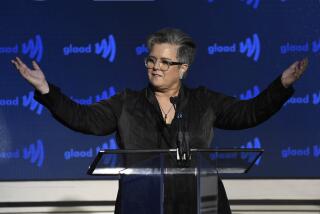Review: Trust Chelsea Handler to do what she does best in Netflix’s ‘Chelsea Does’
Chelsea Handler, formerly host of the E! talk show “Chelsea Lately” and author of books including “My Horizontal Life: A Collection of One-Night Stands” and “Are You There, Vodka? It’s Me, Chelsea” stops on the way to her upcoming Netflix-based talk show as the host and partial subject of a documentary series, “Chelsea Does.”
Its four parts, which are titled “Marriage,” “Race,” “Silicon Valley” and “Drugs,” are available, also from Netflix, beginning Saturday.
See more of Entertainment’s top stories on Facebook >>
What makes Chandler appealing, even admirable, to some is exactly what makes her difficult, even deplorable, to others — a forthrightness that can seem offensive, a trust in her own goodness and talent that can read like egotism.
It is also possible to waffle between those positions, to the extent you find this joke funny or flat, or that position harmonious or out of joint with your own.
But her brassiness does make her interesting, and makes her a good interviewer. She’s willing to let other people talk, to amaze or entertain her, in part because that’s where the comedy lies, and she’s willing to listen, because she’s smart and (willingness to rankle notwithstanding) polite. It’s a requirement of her job to take in the world — to find it interesting or ridiculous in order to send it back into the world as humor.
Produced by Morgan Neville (“20 Feet from Stardom”) and directed throughout by Eddie Schmidt with an expensive-looking creaminess, each episode spends upward of an hour going back and forth through the subject, in different ways: conversational (Handler hanging out with friends, some of them also famous, some of them also comedians, to discuss the matter at hand, or talking to experts in the relevant field); confessional (one on one with a clinical psychologist); and experiential, as she puts herself into different environments, or experiments on herself, to learn something new.

In the episodes on “Marriage,” “Race” and “Silicon Valley,” the governing idea is for her to engage with things she imperfectly understands, or has a difficult relationship with.
“Drugs” — in which she smokes pot with Willie Nelson in his tour bus (“Do you get stoned before you go onstage?” she asks him; “Probably,” he replies, after a moment of confusion) and travels to Peru to experience Ayahuasca — is a subject she feels pretty good about, schooled in a first-hand, if not a scientific way. She sits down with people who can’t handle them, without ever feeling it’s about her.
“I like being bad, it’s fun,” she says. “I glorify the lifestyle that I lead; I definitely glorify it; I think it’s glorifiable. There are many people in my life who think that I have a problem, but the only opinion I’m concerned about is my own.”
Similarly, in the episode that deals with race — in which Handler explores neighborhoods of Los Angeles she never knew existed, she engages with black victims of police violence, and travels to the Deep South to interview people creepily inured to their own racism — she remains protective of her own right to make jokes about anyone and everything.
“I think it’s important to think about things you haven’t experienced and haven’t affected you directly,” she says, “because in some way they have.”
But her last pitch is for everyone “not to take themselves so seriously.”
--------------------
‘Chelsea Does’
Where: Netflix
When: Any time, starting Saturday
Rating: TV-MA (may be unsuitable for children under the age of 17)
More to Read
The complete guide to home viewing
Get Screen Gab for everything about the TV shows and streaming movies everyone’s talking about.
You may occasionally receive promotional content from the Los Angeles Times.







